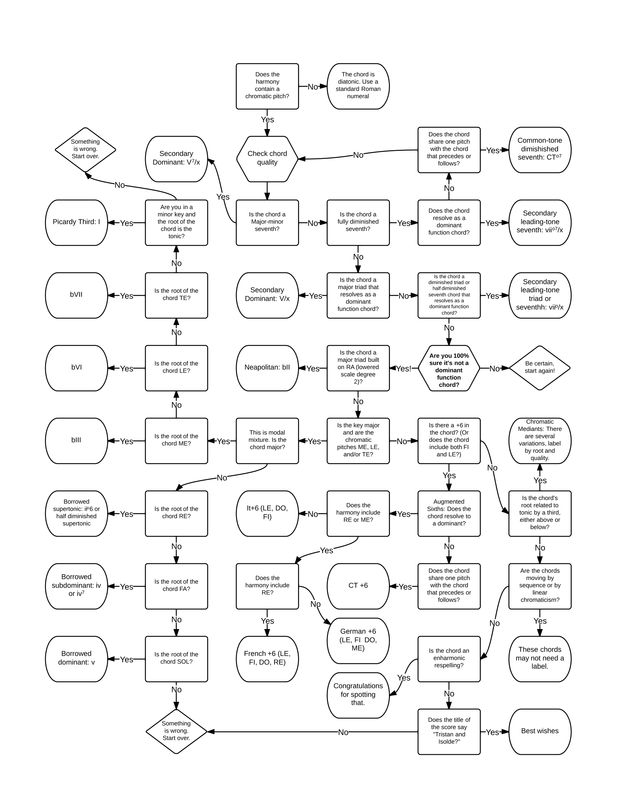|
A few years ago I created a flowchart to help my second year music theory students decipher chromatic harmony. It's by needs a bit simplistic and certainly not exhaustive (e.g. it doesn't address popular harmony nor does it help for extensions past the seventh), but I think it's a good start and has been a useful tool for my students in moments when they just can't seem to find an answer. Feel free to download a .pdf version for your own use! Note that the flowchart uses "movable do" solfege to identify scale degrees, something that I find helpful when teaching concepts involving modal mixture.
4 Comments
(I had the opportunity today to answer a question on the music teachers Facebook group from a high school choir director asking for tips for teaching AP music theory. I'm going to paraphrase some of that response here.)
My first bit of advice was to peruse some of the more commonly used music theory textbooks to see which seems a good fit. While most textbooks appropriate for teaching undergraduate theory are similar, they do have some differences, especially in the amount of prose and the amount of contextual analysis and Schenkerian concepts they use. I currently use the Musician's Guide to Theory and Analysis by Clendinning/Marvin but I have also used, and liked textbooks by Ralph Turek, Kostka/Payne, and Benward/Saker. In the end, with enough experience teaching theory, there really is no need for a textbook and you can get by with a resource like the wonderful Open Music Theory and worksheets and exercises created yourself. For teaching aural skills, I'm a devotee of Gary Karpinski's pedagogical methods and thus highly recommend his Manual for Ear Training. There is an accompanying sight singing book that corresponds with the dictation text, but any set of melodies could be used. However, I do believe that you can probably teach the aural skills component of AP Music Theory without a textbook, though I personally wouldn't choose to do so. There are also several references that are invaluable sources for pedagogical advice. There are two books that are must reads for anyone who teaches music theory. The first is Michael Roger's venerable Teaching Approaches in Music Theory and Gary Karpinski's Aural Skills Acquisition. Another great resource is the Journal of Music Theory Pedagogy which has now been made FREE (!!) for anyone to download and read any of the multitude of articles that address virtually every topic in theory teaching. Finally, the College Board itself has study guides and curriculum guides available for all of its AP courses, including AP music theory. Careful study of that and a comparison with a textbook table of contents can possibly provide a good starting point for piecing together a curriculum. For the past 10 years I've had the privilege of teaching, among other things, first semester music theory. Each fall semester I greet a new group of first-year music majors to my classroom with the assumption that they have very little background in music theory and fundamentals. As a result, the bulk of the fall semester is spent teaching the fundamentals of music before proceeding into two voice counterpoint and the heart of the undergraduate theory curriculum.
However, there are a few theory skills that I find to be extremely useful for incoming students. Some of these are pretty basic, which is precisely why they are on this list.
|
|||||||

 RSS Feed
RSS Feed